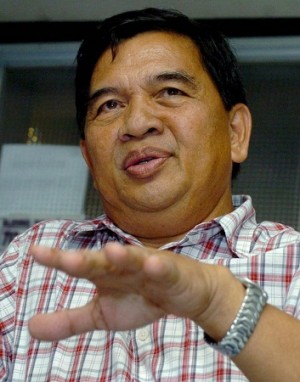MNLF to gov’t: What about our pact?
MANILA, Philippines—With the spotlight on the current breakthrough on a wealth-sharing agreement with the Moro Islamic Liberation Front (MILF), questions remain regarding the status of the peace agreement entered into by the government with the Moro National Liberation Front (MNLF) in 1996.
According to former Cotabato City Vice Mayor Muslimin Sema, who chairs an MNLF faction, informal talks with government representatives may push through this August in Manila under the auspices of the regular tripartite review on the implementation of the Final Peace Agreement (FPA) between the government and the MNLF.
According to Sema, the last tripartite meeting was held last year in Indonesia. Regular reviews are conducted with the Organization of the Islamic Council (OIC), with Indonesia as facilitator.
The current negotiations with the MILF, a breakaway faction of the MNLF, are being held through the facilitation of Malaysia.
Sema said it was important to reconcile the two agreements before a new Bangsamoro Basic Law is passed.
Article continues after this advertisementIf this is done after a basic law is passed, the agreements “may already be irreconcilable,” Sema said.
Article continues after this advertisementSema was reacting to an Inquirer report published on Sunday on how the government and the MILF reportedly agreed on a 75-25 revenue-sharing deal (in favor of the new Bangsamoro homeland) and a 50-50 deal on energy and gas resources in their peace agreement.
Sema was quick to add that this would not be the first wealth-sharing agreement signed by the government with a Moro rebel group.
“Is this the first time the GPH (Government of the Philippines) negotiated on the wealth-sharing issue? This issue (wealth-sharing) was settled in the 1996 Final Peace Agreement and even in the tripartite review on the implementation of the FPA. The latest agreement with the MNLF in Surabaya, Indonesia, is that the government and the autonomous government will comanage the mines and minerals,” Sema said.
“What remains to be discussed is how many percent for each. But the comanagement understanding is a welcome development,” he said.
Even as President Aquino has called the Autonomous Region in Muslim Mindanao (ARMM) a “failed experiment,” the government and the MNLF continue with the tripartite review of the status of the implementation of the 1996 peace agreement, he said.
“We are not having negotiations. We are just trying to put back on track the derailed implementation of our FPA,” said Sema, who sits in the tripartite meetings.
Sema warned that “destroying the FPA (between the government and the MNLF) would have far-reaching consequences on the search for a negotiated settlement of the Moro question.”
“We have in fact made it easy for (the government) to resolve the issue of implementing the FPA by agreeing to just amend Republic Act No. 9054 or the Organic Law that created the ARMM to settle remaining contentious points on the area of autonomy, transition mechanism and identification of mines and minerals. We hold onto the FPA and the Tripoli Agreement,” Sema said.
The Tripoli Agreement was the basic framework for a Muslim autonomous state drafted in Tripoli by the then Marcos regime, through the mediation of then Libyan strongman Moammar Gadhafi.
Sema was circumspect when asked what the MNLF would do if the government fails to reconcile its agreements with the MNLF and the MILF and proceeds to establish the Bangsamoro political entity to replace the ARMM.
“It’s a question I have no ready answers for. But the MNLF, like a child, has grown up,” Sema said.
“But we were informed informal talks will be held in August in Manila. I hope they will push through,” he said.
The Presidential Adviser on the Peace Process, Secretary Teresita “Ging” Deles, said at a dinner with reporters last week the government hoped to have a final tripartite meeting “to say that the implementation review has been completed.”
“We are engaging the communities directly. What’s difficult with the MNLF is they are so split up. What you are interested in is the people, their communities, because they feel they never had the peace dividend,” she said.
Should there be a Bangsamoro political entity in place, MNLF leaders could also “run in the elections” in 2016, Deles said.
The MNLF’s legal counsel, Yasser Omar Sema, questioned the silence of the government-MILF wealth-sharing annex on the so-called Regalian Doctrine, which is enshrined in the Constitution.
The Regalian Doctrine, embodied in Section 2 of Article XII of the Philippine Constitution, states that all lands and natural resources in the public domain belong to the state.
Lawyer Armi Bayot, a member of the legal team from the Office of the Solicitor General, said the government panel negotiating with the MILF agreed to remove references to the Regalian Doctrine in the wealth-sharing annex to show respect and acknowledge the history of the Bangsamoro people.
